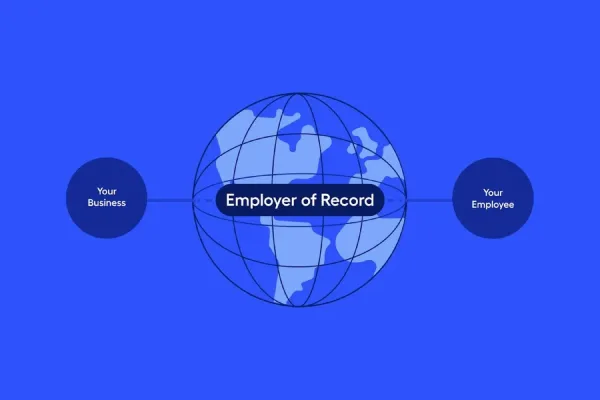We’ve read a lot about what an EOR is and its benefits. But today, let’s take a practical approach and understand how an Employer of Record can help you manage one of the trickiest parts of the Saudi work journey—the final exit.
Let’s begin!
It was 7:47 AM.
Rami stood by his apartment window, coffee in hand, eyes fixed on the city skyline. Riyadh was waking up—but he was preparing to leave.
He had spent almost 6 years here.
Built a strong career. Paid his dues. But when it came time to leave, things didn’t go as planned.
Rami had planned everything: resignation submitted, exit date finalized, flight booked.
But then reality kicked in—
- His employer delayed Iqama’s cancellation.
- GOSI wasn’t deregistered.
- Visa clearance? Still Pending.
And no, he couldn’t leave without completing all formalities. His final exit wasn’t just a goodbye—it was paperwork. Legal hurdles. Government approvals.
That’s when someone at his office whispered, “Call an EOR.”
Wait—what is an Employer of Record, really?
You’ve probably heard the term ‘EOR’—especially if you’ve worked in Saudi Arabia for a while.
But today, let’s break it down. Not the brochure version—the real deal.
Because understanding what an Employer of Record actually does—might just be the smartest thing you do before your next career move in KSA.
An Employer of Record (EOR) is a licensed third-party organization that becomes your legal employer in Saudi Arabia. It helps businesses hire, manage, and offboard employees legally in KSA—even if the business itself has no local entity.
They don’t control your work. They just handle the legal stuff:
- Iqama issuance and transfer
- Payroll and GOSI
- Ministry coordination
- Final exit and re-entry support
- Contract compliance
- End-of-service settlements
In short—they become your shield. And your shortcut.
Want to explore the full scope of EOR benefits? Employer of Record (EOR) in Saudi Arabia: Your Ultimate Expansion Hack
Can an EOR really help with final exit in Saudi Arabia?
Absolutely.
A reliable EOR partner doesn’t just support you—they manage the entire exit process from start to finish. Here we mentioned what they usually handle:-
- Proper Iqama cancellation through official channel.
- Clean deregistration from GOSI.
- Accurately calculates your end-of-service benefits.
- Coordinates with key ministries like Jawazat and MHRSD.
- Timely submission of visa and exit requests.
- Proactive issue resolution to avoid delays
No chasing HR. No waiting in endless queues. Just a clean, lawful, and timely exit—done right.
What are the new rules in Saudi Arabia for final exit?
Here’s what’s changed recently:
- Employer approval is mandatory: Final exit requests must now be submitted by the employer. This is done through official portals like Muqeem or Absher Business. Without employer approval, the visa process won’t even begin.
- Iqama validity must be 30+ Days: Your Iqama (residency permit) must have at least 30 days of validity at the time of application. If it’s already expired—or has less than 30 days left—your exit visa will be rejected.
- Unpaid dues = No exit: All dues must be cleared before exit. This includes traffic fines, salary settlements, and any pending penalties. The Ministry has tightened the system. No clearance, no visa.
- Exit is now fully digital: The entire process has moved online via Absher or Muqeem. No paperwork. But it comes at a cost—stricter auto-rejections for any missing data or incomplete submissions.
- GOSI deregistration (not mandatory yet): As of now, GOSI deregistration is not officially required to get a final exit visa. However, some companies may still ask for it as part of internal procedures.
How many days to process exit visa in Saudi Arabia?
That depends on how you handle it:
- With an EOR, the final exit process usually takes just 7 to 10 business days.
- If you’re doing it on your own, it can take 4 to 6 weeks—sometimes even longer.
Delays happen due to:
- Pending GOSI deregistration
- Lack of employer approvals
- System errors in Absher or Muqeem
- Missed document uploads
With an EOR, these roadblocks are handled for you—quickly and legally.
How an Employer of Record (EOR) can help you exit in Saudi Arabia legally: step-by-step
In the following section, you’ll find exactly learn how an EOR simplifies the entire process—step by step:
Step 1: Consultation with experts
The process begins with a simple consultation. The EOR partner first reviews:
- Current employment status
- Contract
- Ensure you are eligible for final exit under Saudi labor law.
Step 2: Clearance from Employer (If Needed)
If required, the EOR liaises with your current employer or sponsor to obtain the necessary clearances and approvals.
Step 3: Document collection
The EOR helps compile all essential documents. It includes:
- Iqama
- Passport
- Final Payslips
- Resignation Letter
- Employer clearance forms, and more.
Step 4: End-of-service calculation
Once the documentation process is complete, they calculate your full end-of-service settlement. It covers unpaid salary, leave encashment, and any pending reimbursements.
Step 5: GOSI Deregistration
The EOR handles your GOSI deregistration —an essential step before departure.
Step 6: Exit visa processing
When all that’s done, EOR submits your final exit request through the Jawazat portal and ensures visa issuance.
Step 7: Government coordination
Last-minute issues with MHRSD or other ministries? The EOR follows up and resolves them professionally.
Step 8: Confirmation & travel
Once approvals are secured, you’re notified—and can book your flight home without stress or legal complications.
The twist: Rami wasn’t leaving after all
Just when everything seemed clear—Rami got another offer. A better one. Suddenly, a final exit from Saudi didn’t make sense anymore. He didn’t want to leave. He wanted to stay.
But there was a catch—his new company wasn’t ready to sponsor him yet.
So, instead of flying home, Rami stepped into a different kind of challenge: changing employers in Saudi Arabia. If you’re in the same situation, you can explore this detailed guide: How to Transfer Employer in Saudi Arabia in 2025 – A Step-by-Step Guide).
But whether you’re exiting for good—or just preparing to move forward—one thing stays constant: An EOR keeps your options open and your legal status secure.
What should you look for in an EOR provider in Saudi Arabia?
Not all EORs offer the same level of service. Here’s what matters:
- MISA-licensed operations
- Experience with exits and legal compliance
- Transparent pricing
- Local PRO and government relations support
- Familiarity with Qiwa, Muqeem, GOSI, and Jawazat systems
- Emergency legal support, when things go wrong
Need a trusted EOR? Meet Connect Resources Saudi Arabia
One trusted name in this space is Connect Resources Saudi Arabia. Whether you’re switching employers, exiting the country, or managing remote hires, Connect Resources offers end-to-end EOR services. They handle everything—from Iqama transfer and GOSI compliance to final exit documentation. Partnering with Connect Resources means fewer roadblocks, fewer delays, and zero guesswork.
Still wondering if you need an EOR? Ask yourself:
- Am I struggling with final exit in Saudi Arabia?
- Is my employer delaying Iqama cancellation?
- Am I planning to switch jobs but unsure of the legal process?
- Is my new employer unregistered in KSA?
- Do I want a clean, lawful process without risking my status?
If you answered yes to any of these—then an EOR is your best way out.







